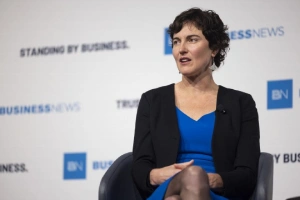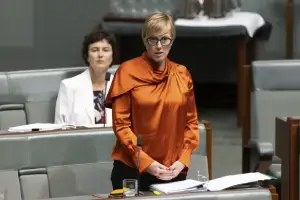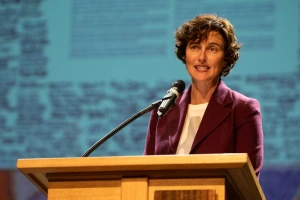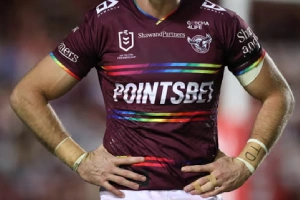 Reports have emerged that the Albanese government has abandoned a proposal for a blanket ban on gambling ads on TV and radio in favour of caps. In response, MP Kate Chaney urged members of the public who are “sick of gambling ads” to contact Communications Minister Michelle Rowland and express their disapproval of the government’s new proposal.
Reports have emerged that the Albanese government has abandoned a proposal for a blanket ban on gambling ads on TV and radio in favour of caps. In response, MP Kate Chaney urged members of the public who are “sick of gambling ads” to contact Communications Minister Michelle Rowland and express their disapproval of the government’s new proposal.
According to anonymous sources whose information on the matter was revealed by the Sydney Morning Herald and the Australian Financial Review, discussions involving the government and stakeholders were held recently, and current plans point to a partial prohibition which will mandate that networks not promote gambling an hour before and after sports broadcasts.
In addition, a cap will see free-to-air networks being prohibited from airing more than two betting ads per hour prior to 10pm. If the bill is passed, it will also result in the implementation of a comprehensive ban on gambling ads on social media.
Gambling Reform Advocates and Networks Alike Have Scrutinised the Potential Proposal
 Another person who strongly criticised the government for this course of action was MP Zoe Daniel. She deemed the government’s actions “weak policing making” on social media platform X, pointing out that most Australians are in favour of wagering ads being fully prohibited and that, compared to the residents of other countries, Australians incur the most losses from gambling annually. She also stressed that partial restrictions have historically led to an increase in betting ads as they were simply moved to other programmes.
Another person who strongly criticised the government for this course of action was MP Zoe Daniel. She deemed the government’s actions “weak policing making” on social media platform X, pointing out that most Australians are in favour of wagering ads being fully prohibited and that, compared to the residents of other countries, Australians incur the most losses from gambling annually. She also stressed that partial restrictions have historically led to an increase in betting ads as they were simply moved to other programmes.
It should be noted that television networks and radio broadcasters were also displeased with the news, albeit for different reasons. As reported by the Australian Financial Review, media giants fear the measure could lead to significant revenue losses. Gambling makes up a significant portion of broadcasters’ revenue, as estimates by the Australian Communications and Media Authority point to free-to-air networks raking in over $238 million from games of chance and sports betting on an annual basis, thanks to their advertising deals with casino and betting giants. Networks are thus calling for the introduction of spectrum fee cuts, as the current fees amount to costs of around AU$40 million per year.
Ms Chaney Believes the Partial Ban Would Not Be Effective in Addressing Gambling Harm
 The blanket ban on gambling adverts across networks was originally a part of 31 proposals included in the Standing Committee on Social Policy and Legal Affairs’ “You win some, you lose more” inquiry, which was helmed by the late Peta Murphy. The review was published in 2023, but the Albanese government was not swift in taking action to implement any of the proposals, and now it appears that the comprehensive prohibition is no longer being considered a viable option.
The blanket ban on gambling adverts across networks was originally a part of 31 proposals included in the Standing Committee on Social Policy and Legal Affairs’ “You win some, you lose more” inquiry, which was helmed by the late Peta Murphy. The review was published in 2023, but the Albanese government was not swift in taking action to implement any of the proposals, and now it appears that the comprehensive prohibition is no longer being considered a viable option.
Ms Chaney was among those who participated in the inquiry, and after learning of the reports surrounding the government’s current plans, she made a post on Facebook in which she urged advocates for gambling reform to reach out to the communications minister regarding their thoughts on the plan.
Ms Chaney also spoke with ABC Radio on the matter and explained why she believes the rumoured proposals would not be sufficient. According to her, the caps would result in Australians still being exposed to a significant number of ads. She also pointed to concerns of parents whose young children are in the know of the intricacies of betting and stressed that partial measures would not “address the normalisation of gambling.”
The Issue of Political Donations and the Integrity of Sports
 During the ABC Radio broadcast, Ms Chaney further spoke about the issue of who the government is consulting with regarding these measures, as there are suspicions that the stakeholders that have been a part of the consultations mainly comprised media companies, sports organisations, and gambling companies, which would all face repercussions from ad restrictions. Emphasis was also placed on political donations, particularly on how gambling operators have made significant donations to both major parties, something Ms Chaney described as “shocking.” The practice is something she disapproves of, given how these companies are supposed to be regulated by the government.
During the ABC Radio broadcast, Ms Chaney further spoke about the issue of who the government is consulting with regarding these measures, as there are suspicions that the stakeholders that have been a part of the consultations mainly comprised media companies, sports organisations, and gambling companies, which would all face repercussions from ad restrictions. Emphasis was also placed on political donations, particularly on how gambling operators have made significant donations to both major parties, something Ms Chaney described as “shocking.” The practice is something she disapproves of, given how these companies are supposed to be regulated by the government.
Finally, when asked what she thought about sports entities like the Australian Football League warning that ad bans would harm their operations financially, she expressed she was sceptical of just how significantly sports industry bodies would be affected. She further stressed that if the measures truly posed a threat to the funding of sports, Australians should consider whether they are alright with sports being this closely linked to gambling.
- Author


